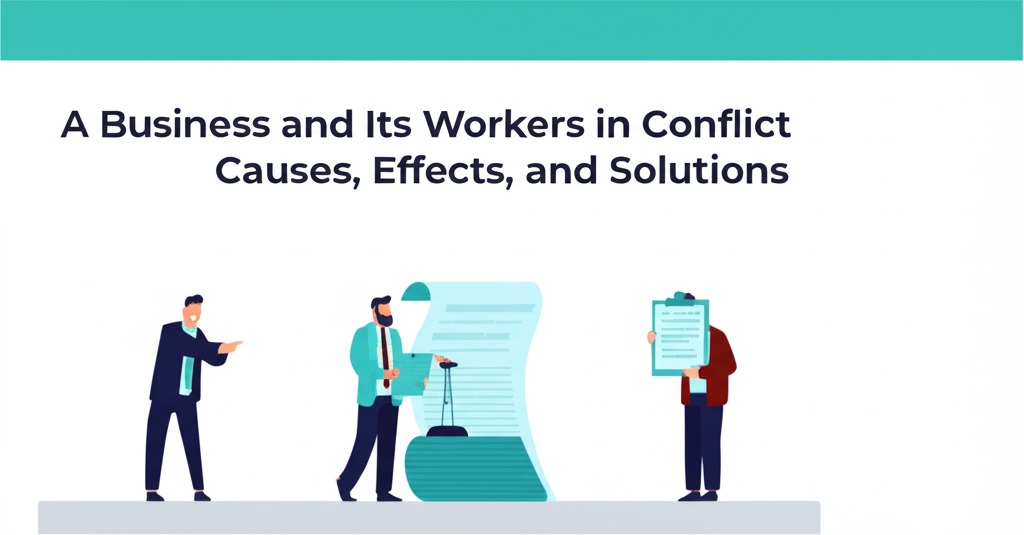Introduction
Conflicts between businesses and their workers are common in the corporate world. Whether it’s disputes over wages, working conditions, or management policies, these conflicts can significantly impact productivity and workplace morale. If left unresolved, they can lead to strikes, lawsuits, and even business failures. In this article, we will explore the primary causes of workplace conflicts, their effects on businesses and employees, and effective strategies to resolve them.
Causes of Conflict Between Businesses and Workers
1. Wage and Compensation Disputes
One of the most frequent causes of conflict is dissatisfaction with wages and benefits. Employees may feel that they are underpaid for their efforts, especially if they perceive discrepancies in pay compared to industry standards or their colleagues.
2. Poor Working Conditions
Unsafe or unhealthy working environments can lead to conflicts between employees and management. Workers expect safe conditions, proper equipment, and reasonable working hours, and failure to meet these expectations can result in dissatisfaction and legal disputes.
3. Unfair Treatment and Discrimination
Discrimination based on gender, race, age, or other factors can create workplace conflicts. When employees feel they are not treated fairly or given equal opportunities for advancement, tension can escalate.
4. Lack of Communication
Ineffective communication between employers and employees can lead to misunderstandings and mistrust. Workers may feel unheard if management does not engage in transparent dialogue or address their concerns.
5. Unrealistic Workloads and Expectations
If employees are consistently overworked or pressured to meet unrealistic deadlines, frustration and burnout can develop. This can lead to conflicts as workers demand more manageable workloads and better work-life balance.
Effects of Workplace Conflicts
1. Decreased Productivity
Workplace disputes often lead to distractions, decreased motivation, and reduced efficiency, which ultimately affect a business’s bottom line.
2. High Employee Turnover
When workers feel undervalued or mistreated, they may seek employment elsewhere, leading to high turnover rates. This results in increased hiring and training costs for businesses.
3. Legal Issues and Financial Losses
Prolonged disputes can lead to lawsuits, fines, and reputational damage. Businesses may have to deal with costly settlements or government penalties due to labor law violations.
4. Declining Employee Morale
A toxic work environment can lead to dissatisfaction among employees, resulting in disengagement, absenteeism, and poor performance.
Strategies to Resolve Workplace Conflicts
1. Open and Transparent Communication
Encouraging honest discussions between management and employees can help address concerns before they escalate. Regular meetings and feedback sessions can promote a culture of openness.
2. Fair Compensation and Benefits
Ensuring competitive salaries and comprehensive benefits packages can prevent wage-related disputes. Offering performance-based incentives can also motivate employees.
3. Promoting a Safe and Inclusive Workplace
Businesses should invest in safety measures, conduct regular training sessions, and enforce anti-discrimination policies to create a healthy work environment.
4. Conflict Resolution Policies
Implementing clear conflict resolution policies, including mediation and arbitration, can help settle disputes in a fair and structured manner.
5. Encouraging Work-Life Balance
Providing flexible work schedules, paid time off, and mental health support can reduce stress and improve employee satisfaction.
Conclusion
Workplace conflicts are inevitable, but how businesses handle them determines their success and employee satisfaction. By fostering open communication, offering fair compensation, and implementing strong conflict resolution strategies, businesses can create a positive and productive work environment. If you are a business owner or an employee facing workplace disputes, take proactive steps today to resolve conflicts and foster a more harmonious workplace.

Josiah Sparks is a business writer and strategist, providing expert insights on management, leadership, and innovation at management-opleiding.org to help professionals thrive. His mission is to empower professionals with practical knowledge to excel in the ever-evolving business landscape.




